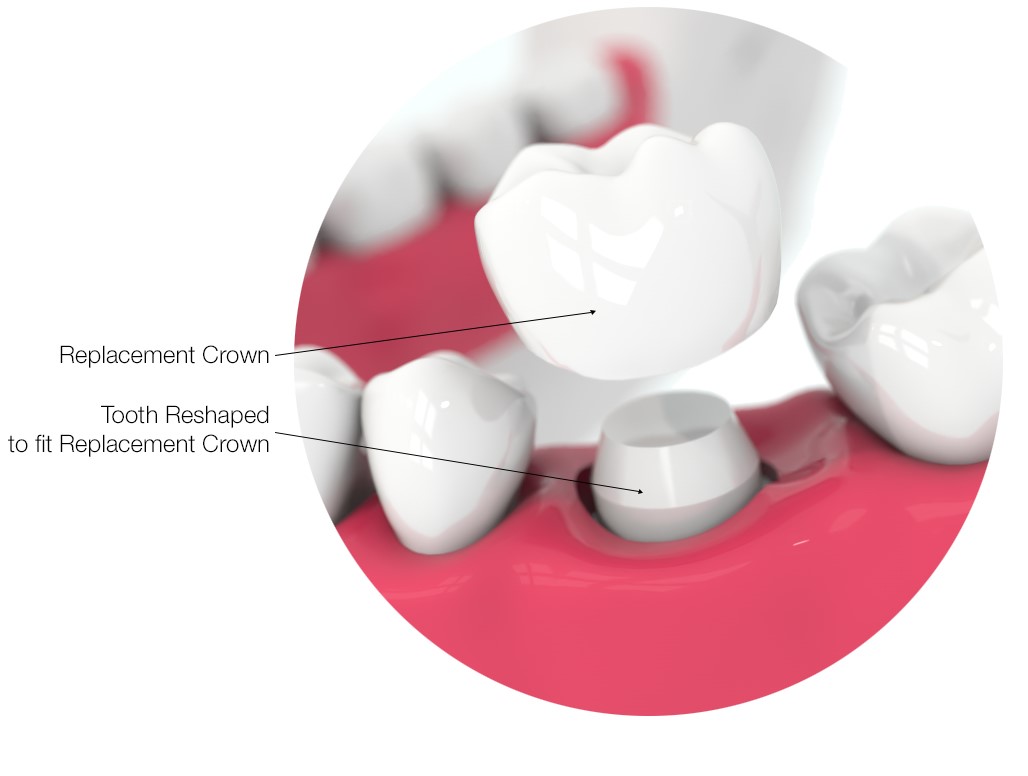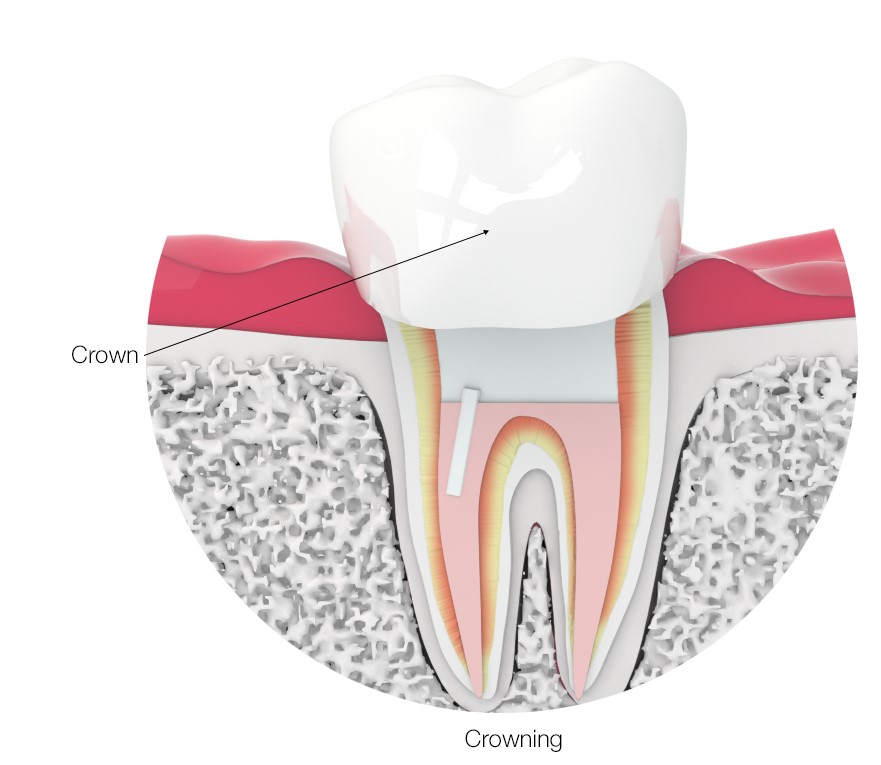What are dental crowns?
Dental crowns or ‘caps’ are made in dental labs and placed on freshly prepared teeth to restore their bite power. Crowns are made-to-order and custom fit by the dentist in the patient’s mouth. They’re used to protect, cover, and restore the shape of teeth when fillings can’t solve the problem. Dental crowns can be made of metals, porcelain, plastic resin, and ceramics and as such they typically don’t require any special care beyond good oral hygiene.


- Are crowns dental implants?
- How long do dental crowns last?
- How is a dental crown fitted?
- How much does a dental crown cost?
- Does insurance cover dental crowns?
- How painful is it to get a crown?
- How to clean dental crowns?
- Can dental crowns get stained?
Are crowns dental implants?
No, dental crowns are not implants. Crowns and implants are two very different things. A dental crown is a cap that is made to be placed over an existing tooth and thus repair the tooth structure and make it functional. A dental implant, by contrast is a surgically added device that’s placed directly in the bone to replace a missing tooth, and this invariably has a dental crown placed on top to look and function like a normal tooth.
How long do dental crowns last?
Dental crowns, regardless of their composition, can last over a decade. The human mouth is a complicated mechanical system with many moving parts, and so there are many different factors that can affect the longevity of a dental crown. A patient’s oral hygiene and everyday habits, how they eat and sleep and their stress levels during the day and whether they wear a dental device at night to prevent grinding can all affect a crowns lifetime.
How is a dental crown fitted?
Dental crown procedures typically happen over a couple of appointments.
First, the dentist examines and prepares (or repairs) the tooth that requires the crown. This might involve taking X-rays of the tooth and it’s in this early phase when first impressions of the patient’s mouth are taken using ceramic molds.
Next, dentists at Archer Dental will file down and remove the outer layer of the tooth. Then another impression will be made of the trimmed tooth and the surrounding teeth. The dentist will place a temporary cap over the stump tooth to protect it in until the permanent crown is cemented.
During this waiting period, the dentist will send ceramic impressions of the patient’s teeth to a lab where they will fabricate the patient’s permanent dental crown. This step may take some time depending on market circumstances and the complexity of the task.
Once the crown has been created, and delivered to the dental office, the patient will be invited to return for the second visit so the dentist can cement the crown into position.
How much does a dental crown cost?
Archer Dental’s prices are in accordance with the Ontario Dental Association Fee Guide. The cost of a crown is $910 + lab fee (which usually is about $350) Please note, this is just an approximate price.
The true cost of dental crowns varies based on three factors: the materials that comprise the crown, the location of the tooth, and the size of the tooth all affect the price of the restoration. This procedure requires working with a 3rd party business, a dental lab who will create the crown the dentist cements into place. Esthetics are important and custom shading, choosing various types of materials i.e. zirconium or emax crowns or gold crowns affects the lab fees and the cost of creation. Archer Dental has excellent partners, and we use the most experienced dental labs who do beautiful work.


Does insurance cover dental crowns?
Yes, the majority of Canadian dental insurance policies offer partial coverage for dental crowns. Most insurance companies make coverage dependent on the reason for the procedure. If done for health reasons, then coverage is possible. But if the crown is placed for cosmetic reasons, insurance may not cover the expense. Quite often, even when the crown is medically necessary, the patient’s policy may only cover half the cost of the procedure, with the patient liable for the rest.
How painful is it to get a crown?
Receiving a dental crown should not cause the patient any more pain or discomfort than getting a typical filling. Dentists will ensure the patient receives numbing jelly on teeth and gums which desensitizes them and surrounding tissues. If more anesthetic is required, this will be injected and the patient might feel a small pinch.
How to clean dental crowns?
Regular brushing and flossing are the very best ways to maintain dental crowns and the teeth they protect. Patients who keep their mouths clean and healthy will have little trouble with their crowns. Cleaning between the teeth with floss is important if patients hope to keep plaque from damaging their new crowns and neighbouring teeth.
Can dental crowns get stained?
Depending on their composition, dental crowns can become stained. Zirconium crowns are more resistant to staining. Porcelain or ceramic crowns are less likely to be compromised than natural teeth, but they are not 100% resistant to the leading causes of tooth stains: coffee, red wine and smoking. Dental crowns can become yellow over time based on their material composition and patients’ oral health and hygiene.
Dental crowns replace missing teeth and can improve self-esteem and advance the patient’s ability to chew and speak properly. They also help maintain the shape of the patient’s face and alleviate the stress on other teeth.

